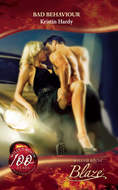Raamatut ei saa failina alla laadida, kuid seda saab lugeda meie rakenduses või veebis.
Loe raamatut: «Once a Rebel»
Maggie froze
Dare she turn her hand over, let his shaft rest against her palm? She wanted to, yet she wasn’t sure she had the courage.
“Do you want to touch me, Maggie?” Cord asked hoarsely.
She swallowed and nodded, but couldn’t seem to move.
He trailed his fingertips over her knuckles, his touch a light dusting. “Have you ever seen a man naked before?”
She widened her eyes at the outlandish notion, briefly met his gaze before hers flickered away. “No.”
He picked up her hand and turned it over, palm up. To her amazement, his hand wasn’t too steady. It made it easier to look at him, see the unexpected vulnerability in his face. See the slight tremble of his shoulders. He was actually trembling. Why? And then she met his eyes.
Without looking away from her, he lifted her hand to his lips and kissed her palm, and then he wrapped her fingers around his smooth, hot manhood. She jumped at the initial touch, as if he’d scorched her, and then watched in awe as the trembling in his shoulders spread through his chest.
MILLS & BOON
Before you start reading, why not sign up?
Thank you for downloading this Mills & Boon book. If you want to hear about exclusive discounts, special offers and competitions, sign up to our email newsletter today!
Or simply visit
Mills & Boon emails are completely free to receive and you can unsubscribe at any time via the link in any email we send you.
Dear Reader,
It’s my hope that by now you’ve read about the fantastical journey of the two Winslow sisters, Reese and Ellie, in Once an Outlaw and Once a Gambler. The heroines and readers were transported to 1870s Deadwood. Now, in Once a Rebel, we return there with Cord Braddock, an ex-stuntman turned private detective who is searching for the two women. Since Cord is half Navajo Indian, the challenges he faces extend beyond traveling through time and falling for a virginal heroine.
Although I’m currently working on a contemporary story, I really hope there are more time-travel romances in my future. Hmm, I’m thinking logging in the Pacific Northwest or maybe even the early frontier of Alaska? Sometimes my mind is a dangerous place. Sure keeps me entertained, though. I hope this story does the same for you.
Happy reading!
Debbi Rawlins
Once A Rebel
DEBBI RAWLINS

TORONTO • NEW YORK • LONDON
AMSTERDAM • PARIS • SYDNEY • HAMBURG
STOCKHOLM • ATHENS • TOKYO • MILAN • MADRID
PRAGUE • WARSAW • BUDAPEST • AUCKLAND
ABOUT THE AUTHOR
Debbi Rawlins lives in central Utah, out in the country, surrounded by woods and deer and wild turkeys. It’s quite a change for a city girl, who didn’t even know where the state of Utah was until four years ago. Of course, unfamiliarity never stopped her. Between her junior and senior years of college she spontaneously left home in Hawaii and bummed around Europe for five weeks by herself. And much to her parents’ delight, she returned home with only a quarter in her wallet.
Books by Debbi Rawlins
HARLEQUIN BLAZE
13—IN HIS WILDEST DREAMS
36—EDUCATING GINA
60—HANDS ON
112—ANYTHING GOES…
143—HE’S ALL THAT*
160—GOOD TO BE BAD
183—A GLIMPSE OF FIRE
220—HOT SPOT**
250—THE HONEYMOON THAT WASN’T*
312—SLOW HAND LUKE*
351—IF HE ONLY KNEW…*
368—WHAT SHE REALLY WANTS FOR CHRISTMAS†
417—ALL OR NOTHING
455—ONCE AN OUTLAW††
I would like to acknowledge that Once a Rebel
is a work of fiction and meant solely to entertain.
While I have paid close attention to historical
detail, now and then I may have stretched the
facts for the sake of the story.
Contents
Chapter 1
Chapter 2
Chapter 3
Chapter 4
Chapter 5
Chapter 6
Chapter 7
Chapter 8
Chapter 9
Chapter 10
Chapter 11
Chapter 12
Chapter 13
Chapter 14
Chapter 15
Chapter 16
Chapter 17
Chapter 18
1
“MAD DOG MANSON still in the wind?” Cord Braddock asked casually as he pocketed the much-needed check he’d just received for his last job. Another messy divorce case. Yeah, the guy was cheating, and Cord had delivered the proof that would net the soon-to-be ex-wife a nice settlement. But if he had to spy on one more sleazy, lying dirtbag husband, he was gonna…
“No.”
“Who caught him?” His gaze shot to Leslie’s impassive face.
“No, you can’t have the job.” Slowly, she shook her head, her blue gaze firm and unwavering. Behind her on the beige office wall was a poster from one of her earliest movies.
“So no one else has bagged him yet.” Now, that was some serious money to be made. Enough for five months’ rent, five lease payments on Cord’s Porsche and next year’s gym membership.
“You’re a private detective, not a bounty hunter, and even if you were, I wouldn’t give you this one.” Leslie slid open her desk drawer and pulled out a strongbox where he knew she kept petty cash. “This is Manson’s third strike. He’s not coming in without taking down anything that moves.”
Yeah, Cord had his P.I. license now, even a gun and permit to carry it, but calling him a private detective was being too generous with the kind of jobs he’d been doing. “I’m not looking for easy.”
“You should be.” She gestured with a lift of her chin. “How’s the shoulder?”
“I want Mad Dog, Leslie.” Out of habit, or because she’d called attention to it, he flexed his injured shoulder. Today it didn’t hurt too much. “I’m dead serious about this.”
She leaned back in her creamy yellow leather chair and stared at him with a sympathy he found hard to stomach. Yet she wasn’t that unlike him. Chewed up and spit out by Hollywood when her use and youth had hit a wall. Still, she’d done okay for herself, invested well while she’d been making some dough, and then bought old man Barker’s detective and bail bonds agency.
Cord hadn’t been so smart. He’d spent the considerable money he’d made as a stuntman on cars and women as fast as he pulled in paychecks, too caught up in the good life to see that inevitably it would come to a crashing end. He pushed up from the too-small chair facing her and stretched out his legs. Nice office, but more chic than practical. Not that he knew anything about practicality. If he did, he’d give up the Porsche.
“Come on, Leslie,” he said smoothly, giving her his best pleading puppy-dog eyes.
Leslie sighed. “No.”
Cord exhaled sharply and looked out the window at the blue California sky, marred only by the persistent gray smog that hung over the Valley. Maybe it was time to move. L.A. was expensive and crowded and toxic. But where would he go? Not back to Arizona. Certainly not back to the reservation. The mere thought sent a shaft of dread down his spine. He’d go back to begging on the streets of L.A. before he’d end up there again.
“I need work, Les, but not this nickel-and-dime stuff.”
“Even the small stuff pays the bills.”
Cord drove a hand through his hair. It was long. Too long. Bad enough being six-three since his size made it hard to blend in when he did surveillance. Looking like the half-Indian he was didn’t help matters. “Don’t worry about my shoulder. I’m back to bench-pressing three times a week. I’m fine.”
“Right.” Her mouth twisted wryly. “That’s why the studios are pounding down your door to offer you work.”
He gritted his teeth, angry, but worse, a heartbeat away from panic. A year had passed since the accident and he still didn’t have full range of motion. One more injury, the doctor had said, and Cord’s arm would be totally useless. “It’s an insurance issue. It doesn’t mean squat.”
“Hell, Cord, make peace with it already,” she said, annoyance flashing in her eyes. “You’re out of the stunt business. For good. Got it? You’re thirty-three, which isn’t so bad, granted, but with your shoulder hanging on by a thread, there will be no more plum jobs. Not the kind that used to pay for your Porsche. For God’s sake, we don’t even know half the guys calling the shots anymore. You understand as well as I do how this town works, you’ve got to know somebody. You’ve already been replaced, my friend. Deal with it.”
She was right. That’s what stunk. It didn’t matter that he still worked out six days a week, that he was strong and fit and had a unique look that had once earned him top dollar when westerns had made a comeback. It meant nothing that he’d never balked at a single stunt they’d asked him to do. The more dangerous, the more willing he’d been to take on the challenge. The truth was, a year out of the business, coupled with an injury that made him a liability, and he was forgotten.
“All the more reason I need better gigs than chasing after scumbag husbands. I need some credibility if I want to make it as a private detective and attract worthwhile clients.”
“You’re absolutely right.” She looked pleased, obviously having bought his line of crap. “That’s why I have a proposition for you.”
“I’m listening.”
“The Winslow case. The sisters are still missing.”
“Not exactly a news flash.” The daughters of actors Brad and Linea Winslow, a Hollywood powerhouse couple, had bizarrely disappeared within six months of each other. Like vultures feasting on roadkill, the media had been all over the story. Until some upcoming young actor had shoved his male lover off the hill below the Hollywood sign.
“Other than the FBI and Malcolm Baxter, who I hear the Winslows have kept on retainer, I doubt many people are working the case at this point. It’s been too long and costly.”
Malcolm Baxter. The smug, condescending bastard. The guy’s name alone was enough to make Cord’s insides clench. Everything about the older man—from his Armani suits to his trademark tasseled Italian loafers—made Cord want to teach the guy a lesson. It wasn’t the man’s success Cord begrudged, but something in his penetrating soulless eyes that seemed to remind Cord of every humiliation he’d suffered since the day he’d left the reservation.
He forced away thoughts of Baxter. “What’s it been, a year and a half since they went missing?”
“Nineteen months, to be exact.” She reached behind and swung her black designer purse off the gleaming mahogany credenza that matched her desk. She set down the fancy bag and fished out a small key.
Yep, Leslie had grown to like nice things. Just like him. Difference was, she could afford them. “According to news reports, the trail went cold fast,” he said, watching her unlock the strongbox. “I don’t think the police picked up a single lead. Not even when the second sister went missing. Even the FBI turned up nothing.”
“That’s right. The mystery of the century some reporters were calling it.” She took out a wad of cash and looked up at him, her blue eyes sparkling with excitement. “Imagine the publicity when someone finally finds them. I mean, they couldn’t have both vanished into thin air. They have to be somewhere.” She gave a small shrug. “Even if it’s just their bodies that turn up.”
He waited for her to finish, and then finally got her meaning. “And you think—” He shook his head in disbelief. At the time, the best in the business had taken up the search. Private dicks and bounty hunters from all over the country had crawled out from under rocks and descended on the vacant house the women had inherited in Deadwood, South Dakota, and where each had last been seen, in hopes of claiming the reward. Even tabloid reporters had dived into the frenzy. Everyone had come up empty. “You’re nuts.”
“You wanted credibility. Not even considering the million bucks the Winslows are offering to locate their daughters, find them and you’d be able to write your own ticket. You’d be in so much demand, you wouldn’t even need me.”
“I can’t afford to go on a wild-goose chase. You know that. Not to mention the expense of traveling all the way to Deadwood. I need a paying job.”
“That’s why I’m willing to stake you.”
Cord briefly eyed the cash. Two stacks. Made up of hundreds. Temptation pulled at his gut. “Why?”
“For half the reward money, and publicity for my agency.”
“So why the sudden interest?” he asked, waiting for her to squirm. This was a bunch of crap. They both knew it.
She didn’t even blink. “Because the Deadwood house has been sold. The new owner is tearing part of it down and having some extensive renovation done to the rest of the building in order to turn it into a bed-and-breakfast. This may be the last chance to uncover any clues.”
He still didn’t buy her motive. “The Winslows sold the house when it’s their last link to their daughters? That doesn’t make sense.”
“I couldn’t agree more.” The corners of Leslie’s mouth quirked. “But I heard that the almighty Malcolm Baxter convinced them that the place was a dead end. Probably got a kickback from the Realtor for convincing them.”
Cord knew she’d never liked Baxter, either. Whatever her reasons, he wasn’t sure. Probably had more to do with professional rivalry since the guy was a shameless publicity whore and managed to snag the best clients. Cord’s dislike went deeper, and Leslie, the conniving little witch, was using Baxter to play Cord. “What makes you think I can do what no one else could?” Grudgingly, because the man did have an uncanny knack for closing a case, he added, “Including the almighty Baxter.”
“You’re good at tracking.”
Cord smiled in spite of himself. Coming from anyone else he would have found the remark a snide commentary on his being half-Navajo. Hell, too bad it hadn’t come from Baxter. It would’ve been Cord’s perfect excuse to pop the guy. Show everyone just how good his shoulder had healed, at the same time send the smug bastard halfway to hell. But someone like Baxter was far too slick and cunning to be an open bigot. Especially not here in good old liberal Hollywood.
Unlike some of the townspeople who lived near the reservation. When the economy was down, there were folks who accused the “dirty, rotten Indians” of taking their jobs, taking food out of the mouths of their children. Cord had been a blameless child himself when he’d crossed into their world. But they’d dragged him through the mud, spat in his face, shaved off his long black hair.
Had circumstances been different when they’d first met, Baxter could’ve been any one of those men. Cord knew the truth of that deep in his gut. He saw it in Baxter’s eyes. They reminded Cord of a past he wanted to forget, pure and simple.
But he wouldn’t let that distract him now. Leslie was right, he was damn good at tracking, but the idea that he could make headway on the high-profile case was ridiculous. He knew exactly what this was about. The sparkling eyes, the phony excitement in her voice, all a nice touch. But of course she’d been a decent enough actress at one time.
“If I’m so good at tracking, why can’t I go after Mad Dog,” he reminded her. “That could net us each a nice payoff.”
Leslie sighed with disgust. “Let it go, Braddock. I’m not helping you cripple yourself for life.” She flipped through the first stack of hundred-dollar bills, as if mentally counting, but he had a feeling she had something else on her mind. “You still seeing Brenda Carlisle?”
“Occasionally. Why?”
Leslie’s lips curved in a rueful smile. “This town isn’t good for you anymore, Cord. Some friendly advice? Get the hell out while you still can.”
He knew she meant well. Brenda was just like the rest of the women in his circle, a circle getting smaller by the day. She was a taker. And lately he had less to give. He shouldn’t resent Leslie’s concern. She was the closest person he had to a friend. He did, anyway.
Clutching the back of the leather guest chair, he watched her lay the two stacks of bills on her desk and then slowly push them toward him.
Hesitating, he tightened his grip. The late afternoon sun filtered through the tinted window and caught his watch. The gold gleamed under the beam of sunlight. Damn, he didn’t want to have to pawn it again.
Cord clenched his jaw, and reached for the money. Only a year ago he’d been sitting on top of the world, his phone ringing off the hook with job offers and A-list party invitations. Then one wrecked shoulder and it had all come to this. His pride was as fragile as the colored beads his grandmother had strung to keep food on their table. And here he was, accepting charity.
2
SHE WAS A SLY ONE, that Leslie. Cord shook his head as he sank to the edge of his bed, irrationally annoyed at the plushness of the burgundy comforter his interior decorator had insisted upon, and pulled off his boots. Not only had Leslie slipped him enough money to pay next month’s rent, but she’d also effectively stopped him from chasing down Mad Dog.
The guy was big and mean but dumb as they came. Wearily, his gaze went to the leather duffel bag sitting on the floor near his walk-in closet. He still hadn’t checked on flights to Deadwood. Going there would appease Leslie, but be a huge waste of his time. He laughed humorlessly. Time was about the only thing he had lately. No money. No prospects. Just a hoity-toity apartment he could no longer afford.
He could downsize, get a cheaper one bedroom in Culver City. Unload some of the furniture through one of those fancy consignment shops. Getting rid of some of this stuff wouldn’t kill him. But the Porsche…
Man, he loved that car.
Even after two years he got a kick out of how valet parkers rushed to the curb when he pulled up. Nah, the car was a deal breaker. He had to do whatever it took to keep her.
He kicked his boots in the direction of the armoire, and then lay back and closed his eyes. The air conditioner kicked on with a low hum and he knew he should get up and close the window. Better yet, turn off the air. Eighteen years he’d been away from the reservation and he still hadn’t acquired a taste for the indoors. He liked an actual breeze skimming his face.
Summers on the reservation had been hotter than hell itself. Burning wood to cook hadn’t helped. Come winter, the mountain of wood Cord kept chopped and the scratchy handmade wool blankets were the only things that kept them warm. His grandmother never complained. Not even when, at seven, Cord had been dropped at her doorstep because his mother had died in a car accident and his father didn’t want to be saddled with a kid.
Cord never thought about his old man, but his grandmother, Masi, he still missed. Diabetes stole her from him two days after he’d turned fifteen. The image of his grandmother’s cold limp body came unbidden and he ruthlessly dismissed it. He’d been clutching her hand for over an hour before his friend Bobby Blackhawk had found him huddled next to her corpse.
The next day Cord had left the reservation. Hadn’t even waited for her burial. Even now, years later, he couldn’t figure out why and the thought still got to him. There was nothing in his useless life he’d regretted more than missing her funeral. Not even the fact that he hadn’t finished high school and hadn’t gotten his GED until he was twenty-two. And only then because he’d been badgered into it by Madeleine Sweeney. But he’d owed the woman. Big-time. Owed her his life, probably.
After three harsh years in L.A., she’d been the first person to really give a damn about him. Sure, he’d tackled the guy who tried ripping off her purse at the sidewalk bistro where she’d been lunching and Cord had been busing tables. But she’d had megabucks and an important producer husband, and she could’ve just as easily given Cord her thanks instead of the introduction that led to his lucrative job as a stuntman.
Sadly, he had attended her funeral last year. The emotional ceremony and church full of mourners had brought up a whole mess of shit he didn’t want to think about. He rolled over onto his stomach, a sudden image of his grandmother’s brown face wreathed in a smile so vivid his breath caught.
He opened his eyes, blinked and then squeezed them shut again, burying his face deeper into the soft comforter.
That had been happening a lot lately. Fleeting memories of her that unsettled him. Last month he’d even foolishly thought he’d caught a glimpse of her standing near a street vendor’s cart on Olvera Street. Madeleine’s untimely death had obviously kicked up a lot of guilt no matter how much he reasoned with himself that he hadn’t actually abandoned Masi. She’d been dead. Gone. Before he’d ever set foot off the reservation.
If anything, she’d abandoned him.
The crazy thought came out of nowhere. She hadn’t chosen to leave him. If she’d had it in her power to stay, she would’ve protected him from the hate and bigotry he encountered after he’d left the Dine. If she hadn’t died, he may never have left at all.
Funny, as a rebellious teen he’d ridiculed the language and customs of the Dine, but even today he thought of them in terms of the Navajo word they called themselves. Dine. The People. It came as naturally to him as breathing. Without resentment. Without judgment.
Besides, he’d never had any quarrel with the Dine. He had some fond memories of days spent swimming in the river and fishing with Bobby Blackhawk, sleeping outside under the stars and sitting around a campfire repeating old Navajo legends they’d heard from the elders.
But he didn’t kid himself that he would’ve been content to stay on the reservation even if his grandmother had lived longer. At fourteen, he’d started getting restless, curious about life outside of his sheltered existence. But at fifteen, he’d been ill-prepared to face adult realities.
On cold lonely nights, his only comfort had been the secret fantasy that he’d once again meet Masi. That maybe she’d traveled to California ahead of him and had been busy setting up a home for them.
He smiled at the memory, reached for one of the pillows propped up against the headboard. By her own belief, the Navajo belief, a spirit never truly died but went on to another life in another place. Naturally he thought that was a bunch of crap—when your time was up, everything went black. No more second chances. Dirt to dirt pretty much summed it up.
He flopped onto his back again and slipped the pillow under his head. Out of the corner of his eye, he caught a glimpse of the duffel bag. Damn it, he had to make up his mind about the Winslow business. Deadwood was a hell of a long way to go for nothing.
CORD OPENED HIS EYES and jackknifed off the bed, his heart hammering his chest. The room was almost black, except for the light from the pool’s reflection intermittently swirling in through the slanted blinds. He stared at the window, still open several inches, and listened. There was only silence now. And his own ragged breathing.
It was a dream. Just a crazy dream.
His pulse slowed as his eyes grew more accustomed to the darkness. How long had he slept? His gaze went to the alarm clock on the nightstand. The glowing red numbers told him it was just after midnight. He swung his feet to the floor, feeling shaky from the events of the dream. Not that he remembered much, only fractured bits of recollection filtered past the fog of sleep. No mistake, the dream had been about Masi.
Normally when he dreamt of his grandmother, he felt comforted. Not tonight. The edginess that crawled over his nerve endings wouldn’t cease. He closed his eyes again, trying desperately to recall more of the dream. He stretched his neck from side to side, trying to ease the tension, as if he could shake loose a memory.
They’d been sitting at their cook fire on the reservation, that much he remembered. Except they were outside and the sun was beginning to set. His age was fuzzy, and Masi looked like she always had—slightly stooped, leathery skin, old before her time. An eagle soared overhead and she’d pointed skyward…and then…
Cord exhaled sharply, and opened his eyes. That’s all he could remember. Frustrated, he pushed up from the bed. The wavering light from the pool caught on the outline of a dark lump sitting between the armoire and the closet. He strained to make out what it was. The black leather duffel.
That’s all it took. Memories of the dream washed over him. The eagle turning into a plane, golden sunlight gilding by the distant hills, the Black Hills, just like in the travel agency brochures. He knew suddenly, deep down in his gut. Masi had plainly told him to go to Deadwood.
TOO BAD, CORD THOUGHT as he stopped the car in front of the Deadwood property. The house was huge, two and a half, maybe three stories, with a big porch facing the west where you could sit and watch the sun go down. The main door was off center, a peculiarity he kind of liked. He wondered which part of the house they were tearing down.
The new owner, who was a developer, had had it with both freelance detectives and reporters, according to his secretary. She’d stopped short of giving Cord a key but she made sure he understood the place was currently deserted and, with a flashing dimple, subtly let him know that the kitchen door was likely to be unlocked. He’d promised the cute little blonde a quiet dinner.
Why not? How much time would it take to find out this case was a dead end? After waiting in crowded airports and then enduring two choppy flights, the whimsy of last night’s dream had worn thin. So had his patience. The blonde would prove a nice distraction tonight. What was her name…? Sue—slightly younger and shorter than he liked them, but she was eager.
He probed his aching shoulder and took a deep breath against the cramping pain. Flying coach was a bitch for someone as tall and broad as he was, but he had to make the cash Leslie had given him last as long as possible. He had every intention of paying her back the amount he’d siphoned off for rent, and whatever he spent on dinner tonight, but the rest was gonna be on her nickel for sending him on this fool’s errand.
After following the side of the house, he spied the kitchen through a bare bay window. With the toe of his black snakeskin boots, he carefully picked his way through some debris to the stoop.
Just like Sue had said, the door was unlocked. Good, they couldn’t get him on breaking, only entering. He smiled wryly, and unnecessarily touched the butt of his gun through his sport jacket. He didn’t need the piece. Transporting it had been more trouble than it was worth. But who knew? Maybe he could finish his business here and still pick up Mad Dog’s trail. General consensus was that the guy had left L.A. and headed east. Cord only needed to swing south to cross his path.
As soon as Cord stepped over the threshold, a cloud of particle-board dust assailed his nostrils. Coughing, he waved a hand to clear the air. The kitchen had been torn apart, the appliances ripped from the wall, half of it already gone, allowing him to see into what must have been a dining room. Only the chandelier and ripped wallpaper remained.
Shaking his head, he walked through the room into another and faced much of the same. No furniture, just big empty spaces, barely contained by walls left with gaping holes and framed by dull peeling paint. The scuffed wood floors didn’t look too bad, there were a few warped floorboards, but that was pretty much it. He shouldn’t be wasting his time here.
Then he noticed the stairs guided by a carved dark cherry banister that ended in two ornate scrolls, and wondered why the workmen hadn’t protected the wood. Surely they would try to salvage this piece. Although his tastes veered to the contemporary end of the spectrum, even he could appreciate the fine craftsmanship.
Without thinking, he ran his palm over the smooth wood and an odd sensation of familiarity washed over him. It called to mind the many times as a kid that he’d watched the elders carve figures of animals to be sold at souvenir shops. Samuel Wauneka had offered to teach him the dying art, and Cord had balked. He hadn’t thought about that in a long time, either.
Cord started up toward the landing, briefly considering if it was worth the risk of checking the second floor.
Not in the hope of finding a lead, but out of simple curiosity. Before he’d consciously made a decision, he tested the stability of the first step. Seemed solid enough for his weight. The workers had to get up there somehow, so he wasn’t too concerned.
The stairs turned out to be surprisingly solid, but not so the internal walls upstairs. On the left side of the house, half of them had already been demolished and lay in crumbled heaps of wood and plaster. Cord poked his head into each room, but there was nothing to see. When he came to another set of narrow stairs, he decided to leave.
He stiffened at the sudden feel of pressure against his lower back, as if someone were pushing him. He jerked around, but no one was there. Feeling foolish, he made a complete circle, anyway. He muttered a curse, and then eyed the stairway. Hell, he’d come this far.
The planks of wood creaked under his weight, although he felt confident that they’d hold him. When he got to the top, the door was stuck, but a firm shove with his good shoulder forced it open. Like the stairs, the entryway was narrow and he had to angle his body sideways to gain access. Ducking his head, he stepped into the small attic.
Enough light filtered in through a cloudy windowpane that he was able to find a string hanging from a bare bulb, which quickly lit the room. Unlike the rest of the house, the contents appeared to have been untouched. In the corner was a dress form next to a bolt of lacy fabric leaning against the wall. Across the room stood a full-length mirror, and behind it an old oak dresser with two missing knobs.
Tasuta katkend on lõppenud.









